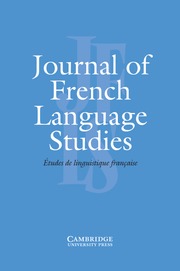JFLS has lost one of its most distinguished editors and friends. Rarely, in my experience, has the death of an academic caused such grief as the untimely passing, on 24th August last, of David Trotter.
Professor of French and Head of Modern Languages at Aberystwyth University, Trotter was born on 27th July 1957, the second child of Mary Yvonne Kirkpatrick and George Douglas Trotter, a University Lecturer in Bristol. He graduated with First Class Honours in French and German from The Queen's College, Oxford, where he remained to write his DPhil thesis, subsequently published as Medieval French Literature and the Crusades, 1100–1300. A Laming Junior Travelling Fellowship enabled him to complete this research in the libraries of Paris, and in 1985 he secured a lectureship in Linguistics and Medieval French at the University of Exeter. In 1993 he was appointed to the Aberystwyth Chair, previously held by Glanville Price, and remained in that position for the rest of his career. He became an editor of JFLS ten years later.
A bibliometric analysis of Trotter's publications, lectures and conference contributions would instantly reveal his intellectual and, indeed, physical energy, but it would barely capture the extent of his perceptiveness and intellectual courage. Throughout his career, his focus was on the languages and cultures of medieval Europe, particularly those of France and Britain. An initial interest in the literature of Old French led to the edition of medieval texts in French, Latin and Middle English (Jean de Vignay's Les Merveilles de la Terre d'Outremer (1990) and part of Alexander of Canterbury's Dicta Anselmi (1994)). Ever fascinated by the multi-dimensional and multi-faceted nature of medieval French, he returned to editing in 2005 with a twelfth-century translation (from Arabic) of the Traitier de Cyrurgie by the Andalusian surgeon Albucasis (936–1013). Trotter's elucidation of the wealth of lexicological material contained in this text and the dialectological data embodied in the translation (Lorraine French) earned him the Prix de La Grange in 2007.
Close textual work made Trotter acutely aware of the sociolinguistic complexity of medieval Europe, before language standardization ironed it all out and made medieval variability so very difficult for us moderns to comprehend. Nowhere was this complexity more intractable than in the field of lexis, where language and society are the most directly connected. The early 1990s were a difficult time for the Anglo-Norman Dictionary. Lexicographical methods and the range of documentation had changed radically since the project had been conceived in the 1950s by Timothy Reid and Louise Stone, but Anglo-Norman studies were still rather looked down upon by Anglicistes in the UK and Francisants in France. The project was taken to completion by William Rothwell, who in the process became acutely aware that the first two volumes (A–E) needed a complete revision. Funding was extremely tight but, working with William Rothwell and Stewart Gregory, David Trotter ensured that the revised volumes were duly published in 2005. By now, however, medieval lexicography was being revolutionized by the computer. In a remarkable collaboration with Michael Beddow and Andrew Rothwell, Trotter transformed the AND into a major online research tool for linguists, historians and literary scholars, through the digitization of the whole dictionary and its source-materials. It has caused us to rethink the fundamentals of the history not only of medieval French, but of medieval English too. This work gained for Trotter a second award from the Académie des Inscriptions et Belles-Lettres in 2011, this time the Prix Honoré Chavée.
Trotter was the reverse of the lone scholar, for he loved working with others and others loved working with him. In his departmental and faculty work in Aberystwyth, he was an inspiring and effective leader, and a tough promoter of languages (and French in particular). The successful publication of the AND2 A-E in 2005 owed as much to his collaborative and diplomatic skills as to his lexicographical prowess. Trotter happily followed a self-denying ordinance, which led to the publication under his editorship of several volumes of other people's work – volumes in honour of individual scholars (John Fox and William Rothwell), conference proceedings and, very recently, an important manual concerned with technical aspects of the edition of medieval texts. His desire for interraction with like-minded scholars drew him quite naturally into the international framework offered by the Société de Linguistique Romane, where he sealed his reputation by almost single-handedly organizing its massive 24th triennial congress in 2003. Trotter's gravitation towards the post of President ten years later was a natural culmination of this activity. He was without doubt the foremost British authority on medieval French in his generation.
This is not the place to write at length of the loss felt by his friends and family, though it is here, of course, that sadness is deepest: to his friends and associates Trotter was a man of great warmth, loyalty and good humour; to his family a dedicated husband and father. I recall an occasion one March when he was trapped by snow in St Andrews. All trains south were cancelled. One of his daughters was to perform in a St David's Day event that evening, so he braved the weather, hired a car and reached Aberystwyth on time.
Replacing David Trotter would have been a herculean task in the most favourable of times. For medieval French language studies in the UK these are far from favourable times, making our collective loss all the more difficult to sustain.



